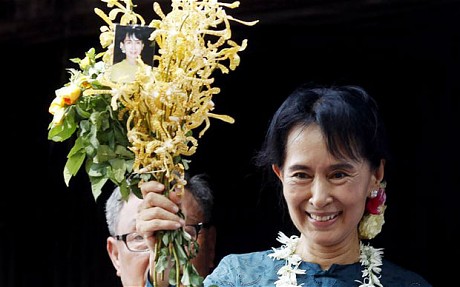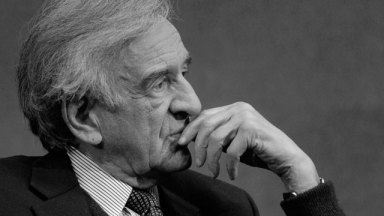The Elie Wiesel Tribute dinner was held to honor leaders who have made a difference in their communities and for humanity. Elie Wiesel himself is a fellow Nobel Laureate and a Holocaust survivor who had seen the brutality of mankind during the Holocaust, yet his faith stayed intact. This year, the United States Holocaust museum bestowed Daw Aung San Suu Kyi with the honor of the Elie Wiesel award for her struggle towards democracy in non-violent means as she continues to fight- unshaken.
Elie Wiesel: “She’s an extraordinary human being with ideals and ideas. And all of these ideals and ideas are all there- not only for her own sake but for her country. And beyond that, to all of the people- men and women – anywhere and everywhere in the world- where ever people suffer. She is part of my consciousness – of my moral obligations. She should know that she’s not alone.”
Like Elie Wiesel, Ms. Gerda Weissman Klein is a Holocaust survivor, and she has experienced atrocities unimaginable. As she recalls the cruelty of mankind during the time of the Nazis, she also remembers the strength and resilience of the Jewish people which gave her as well as others freedom inevitably.
Ms. Gerda Weissman Klein: ” You, Madame, so far away in Burma, must know that you have inspired all those who look to the moon and who look to you who has been the guiding stars to so many who have lived in peril and in slavery. I too, have been deprived of freedom for 6 years in Nazi, Germany. Emptiness can be so heavy. How cries of pain can be so silent, yet you Madame are in every heart, every thought- of those present here tonight and all those who have worked for freedom and to the millions who are still yearning for freedom.”
Despite the despair that the memory of the Holocaust brings, ultimately, the night echoed the theme of courage and hope. Actress, Natalie Portman bestowed the Elie Viesel award to Daw Aung San Suu Kyi by reading a speech of hers from her book,“ Freedom from Fear”.
Natalie Portman: ” Here is what she said: It is not power that corrupts, but fear. It is not power that corrupts but fear. Fear of losing power corrupts those who wield it and fear of the scourge of power corrupts those who are subject to it…”
Daw Aung San Suu Kyi had words of her own for the tribute dinner. She spoke via a pre-recorded video.
Daw Aung San Suu Kyi: “There are certain things we must not forget, because we would not like these to be repeated in the future. And I thank and honor all of you who are trying to make known to the world- what should not happen again. And individuals can make all the difference- individuals who survive in spite of the greatest cruelty – in spite of the greatest trials and to teach other people that it’s possible to survive. And to you all who have not only survived but helped others to survive – by speaking of your experiences- and by teaching them how to be brave and how NOT to lose your integrity in the face of the greatest difficulty. I would like to say, “ Thank you. I honor you. I respect you. And I hope that I too will be able to be like you.”
With on going talks between the United States and Burma, White House Chief of Staff, Jack Lew spoke of the Lady of Burma.
Jack Lew: ” Many times Daw Suu could’ve decided that she had done enough that it was someone else’s turn to sacrifice. But she refused to give up. Instead she continued to inspire the entire world with her faith in nonviolent action and her belief that freedom would ultimately prove greater than tyranny.”
The dinner was a successful charity event, which honored the lives that were lost during the Holocaust and commemorated the past while at the same time reassuring that such a tragedy never happens again. As the United States and the Western world is reaching out to engage in Burma’s new transition to democracy, all eyes are on the Lady of Burma, Daw Aung San Suu Kyi with her extensive belief in the nation’s reform towards freedom.
English Version:
Burmese Version:
Producers: Thet Su Naing/ Kaye Lin
Assistant Producer: Lwin Nyein Chan Kyaw
Reporters: Thet Su Naing / Kaye Lin
Videography: Lwin Nyein Chan Kyaw / Kaye Lin













